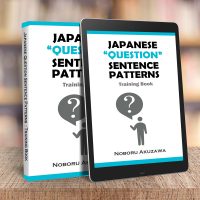Meaning: the point is…; in short…; to put it simply
Formation:
要するに + phrase
日本語 / にほんご / Japanese
(1) 要するに、私たちは資金が不足している / 不足しています。
(2) 要するに、彼らは若すぎる / 若すぎます。
(3) 要するに、甥が不注意だった / 不注意でした。
(4) 要するに、僕は彼のことを信用していない / 信用していません。
(5) 要するに、私たちの顧客はその結果に満足した / 満足しました。
(6) 要するに、私は世界と日本の架け橋になりたい / 架け橋になりたいです。
ことばと表現 / Words & Expressions
……が不足している【がふそくしている】 be short of……
架け橋【かけはし】bridge
英語 / えいご / English
(1) The point is that we are short of funds.
(2) The point is they are too young.
(3) In short, my nephew was careless.
(4) In short, I don’t trust him.
(5) In short, our client was happy with that result.
(6) In short, I want to become a bridge between Japan and the rest of the world.
ひらがな / Hiragana
(1) ようするに、わたしたちは しきんが ふそくしている / ふそくしています。
(2) ようするに、かれらは わかすぎる / わかすぎます。
(3) ようするに、おいが ふちゅうい だった / ふちゅうい でした。
(4) ようするに、ぼくは かれのことを しんようしていない / しんようしていません。
(5) ようするに、わたしたちの こきゃくは そのけっかに まんぞくした / まんぞくしました。
(6) ようするに、わたしは せかいと にほんの かけはしに なりたい / かけはしに なりたいです。
ローマ字 / Roman letters
(1) Yōsuruni, watashitachiha shikin ga fusoku shite iru/ fusoku shite imasu.
(2) Yōsuruni, karera wa waka sugiru/ waka sugimasu.
(3) Yōsuruni, oi ga fuchūidatta/ fuchūideshita.
(4) Yōsuruni, boku wa kare no koto o shin’yō shite inai/ shin’yō shite imasen.
(5) Yōsuruni, watashitachi no kokyaku wa sono kekka ni manzoku shita/ manzoku shimashita.
(6) Yōsuruni, watashi wa sekai to Nihon no kakehashi ni naritai/ kakehashi ni naritaidesu.
























No comments yet.